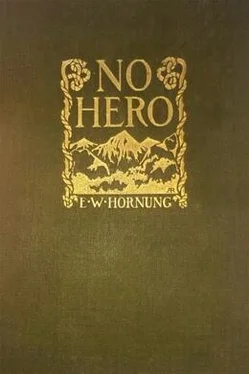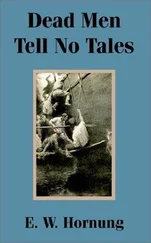E. Hornung - No Hero
Здесь есть возможность читать онлайн «E. Hornung - No Hero» весь текст электронной книги совершенно бесплатно (целиком полную версию без сокращений). В некоторых случаях можно слушать аудио, скачать через торрент в формате fb2 и присутствует краткое содержание. Год выпуска: 2017, Издательство: epubBooks Classics, Жанр: Классический детектив, на английском языке. Описание произведения, (предисловие) а так же отзывы посетителей доступны на портале библиотеки ЛибКат.
- Название:No Hero
- Автор:
- Издательство:epubBooks Classics
- Жанр:
- Год:2017
- ISBN:нет данных
- Рейтинг книги:5 / 5. Голосов: 1
-
Избранное:Добавить в избранное
- Отзывы:
-
Ваша оценка:
- 100
- 1
- 2
- 3
- 4
- 5
No Hero: краткое содержание, описание и аннотация
Предлагаем к чтению аннотацию, описание, краткое содержание или предисловие (зависит от того, что написал сам автор книги «No Hero»). Если вы не нашли необходимую информацию о книге — напишите в комментариях, мы постараемся отыскать её.
.’
No Hero — читать онлайн бесплатно полную книгу (весь текст) целиком
Ниже представлен текст книги, разбитый по страницам. Система сохранения места последней прочитанной страницы, позволяет с удобством читать онлайн бесплатно книгу «No Hero», без необходимости каждый раз заново искать на чём Вы остановились. Поставьте закладку, и сможете в любой момент перейти на страницу, на которой закончили чтение.
Интервал:
Закладка:
"What the devil for?" I demanded, thinking for the moment of no shoulders but my own.
"To give that bounder Quinby the licking he deserves!" cried Bob: "to give it him now at once, when the post comes in, and there are plenty of people about to see the fun. Do you know what he's been saying and spreading all over the place?"
"No," I answered, my heart sinking within me. "What has he been saying?"
The colour altered on Bob's face, altered and softened to a veritable blush, and his eyes avoided mine.
"I'm ashamed to tell you, it makes me so sick," he said, disgustedly. "But the fact is that he's been spreading a report about Mrs. Lascelles; it has nothing on earth to do with me. It appears he only heard it himself this morning, by letter, but the brute has made good use of his time! I only got wind of it an hour or two ago, of course quite by accident, and I haven't seen the fellow since; but he's particularly keen on his letters, and either he explains himself to my satisfaction or I make an example of him before the hotel. It's a thing I never dreamt of doing in my life, and I'm sorry the poor beast is such a scarecrow; but it's a duty to punish that sort of crime against a woman, and now I'm sure you'll lend me one of your sticks. I am only sorry I didn't bring one with me."
"But wait a bit, my dear fellow," said I, for he was actually holding out his hand: "you have still to tell me what the report was."
"Divorce!" he answered in a tragic voice. "Clephane, the fellow says she was divorced in India, and that it was—that it was her fault!"
He turned away his face. It was in a flame.
"And you are going to thrash Quinby for saying that?"
"If he sticks to it, I most certainly am," said Bob, the fire settling in his blue eyes.
"I should think twice about it, Bob, if I were you."
"My dear man, what else do you suppose I have been thinking of all the afternoon?"
"It will make a fresh scandal, you see."
"I can't help that."
And Bob shut his mouth with a self–willed snap.
"But what good will it do?"
"A liar will be punished, that's all! It's no use talking, Clephane; my mind is made up."
"But are you so sure that it's a lie?" I was obliged to say it at last, reluctantly enough, yet with a wretched feeling that I might just as well have said it in the beginning.
"Sure?" he echoed, his innocent eyes widening before mine. "Why, of course I'm sure! You don't know what pals we've been. Of course I never asked questions, but she's told me heaps and heaps of things; it would fit in with some of them, if it were true."
Then I told him that it was true, and how I knew that it was true, and my reason for having kept all that knowledge to myself until now. "I could not give her away even to you, Bob, nor yet tell you that I had known her before; for you would have been certain to ask when and how; and it was in her first husband's time, and under his name."
It was a comfort to be quite honest for once with one of them, and it is a relief even now to remember that I was absolutely honest with Bob Evers about this. He said almost at once that he would have done the same himself, and even as he spoke his whole manner changed toward me. His face had darkened at my unexpected confirmation of the odious rumour, but already it was beginning to lighten toward me, as though he found my attitude the one redeeming feature in the new aspect of affairs. He even thanked me for my late reserve, obviously from his heart, and in a way that went to mine on more grounds than one. It was as though a kindness to Mrs. Lascelles was already the greatest possible kindness to him.
"But I am glad you have told me now," he added, "for it explains many things. I was inclined to look upon you, Duncan—you won't mind my telling you now—as a bit of a deliberate interloper! But all the time you knew her first, and that alters everything. I hope to out you still, but I sha'n't any longer bear you a grudge if you out me!"
I was horrified.
"My dear fellow," I cried, "do you mean to say this makes no difference?"
"It does to Quinby. I must keep my hands off him, I suppose, though to my mind he deserves his licking all the more."
"But does it make no difference to you ? My good boy, can you at your age seriously think of marrying a woman who has been married twice already, and divorced once?"
"I didn't know that when I thought of it first," he answered, doggedly, "and I am not going to let it make a difference now. Do you suppose I would stand away from her because of anything that's past and over? Do they stand away from us for—that sort of thing?"
Of course I said that was rather different, with as much conviction as though the ancient dogma had been my own.
"But, Duncan, you know it's the very last thing you're dreaming of doing yourself!"
And again I argued, as feebly as you please, that it was quite different in my case—that I was a good ten years older than he, and not my mother's only son.
Bob stiffened on the spot.
"My mother must take care of herself," said he; "and I," he added, "I must take care of myself, if you don't mind. And I hope you won't, for you've been most awfully good to me, you know! I never thought so until these last few minutes; but now I sha'n't forget it, no matter how it all turns out!"
Chapter IX
Sub Judice
Well, I made a belated attempt to earn my young friend's good opinion. I kept out of his way after dinner, and went in search of Quinby instead. I felt I had a crow of my own to pluck with this gentleman, who owed to my timely intervention a far greater immunity than he deserved. It was in the little billiard–room I found him, pachydermatously applauding the creditable attempts of Sir John Sankey at the cannon game, and as studiously ignoring the excellent shots of an undistinguished clergyman who was beating the judge. Quinby made room for me beside him, with a civility which might have caused me some compunction, but I repaid him by coming promptly to my point.
"What's this report about Mrs. Lascelles?" I asked, not angrily at all, for naturally my feeling in the matter was not so strong as Bob's, but with a certain contemptuous interest, if a man can judge of his own outward manner from his inner temper at the time.
Quinby favoured me with a narrow though a sidelong look; the room was very full, and in the general chit–chat, punctuated by the constant clicking of the heavy balls, there was very little danger of our being overheard. But Quinby was careful to lower his voice.
"It's perfectly true," said he, "if you mean about her being divorced."
"Yes, that was what I heard; but who started the report?"
"Who started it. You may well ask! Who starts anything in a place like this? Ah, good shot, Sir John, good shot!"
"Never mind the good shots, Quinby. I really rather want to talk to you about this. I sha'n't keep you long."
"Talk away, then. I am listening."
"Mrs. Lascelles and I are rather friends."
"So I can see."
"Very well, then, I want to know who started all this. It may be perfectly true, as you say, but who found it out? If you can't tell me I must ask somebody else."
The ruddy Alpine colouring had suddenly become accentuated in the case of Quinby.
"As a matter of fact," said he, "it was I who first heard of it, quite by chance. You can't blame me for that, Clephane."
"Of course not," said I encouragingly.
"Well, unfortunately I let it out; and you know how things get about in an hotel."
"It was unfortunate," I agreed. "But how on earth did you come to hear?"
Quinby hummed and hawed; he had heard from a soldier friend, a man who had known her in India, a man whom I knew myself, in fact Hamilton the sapper, who had telegraphed to Quinby to secure me my room. I ought to have been disarmed by the coincidence; but I recalled our initial conversation, about India and Hamilton and Mrs. Lascelles, and I could not consider it a coincidence at all.
Читать дальшеИнтервал:
Закладка:
Похожие книги на «No Hero»
Представляем Вашему вниманию похожие книги на «No Hero» списком для выбора. Мы отобрали схожую по названию и смыслу литературу в надежде предоставить читателям больше вариантов отыскать новые, интересные, ещё непрочитанные произведения.
Обсуждение, отзывы о книге «No Hero» и просто собственные мнения читателей. Оставьте ваши комментарии, напишите, что Вы думаете о произведении, его смысле или главных героях. Укажите что конкретно понравилось, а что нет, и почему Вы так считаете.










